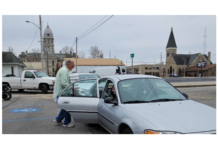WINONA LAKE – Among the speakers at the 2022 Lost Sparrows Trauma Conference will be a former NFL player, an inspirational speaker born without arms who plays music using his feet, one of America’s foremost child behavior and adoption experts and about 18 others.
The conference, with a theme this year of “The Ripple Effect,” is Oct. 14-15 on the campus of Grace College in Winona Lake.
Darren Gagnon, co-founder and president of Lost Sparrows, said his organization, for the most part domestically, is a “nonprofit that provides trauma education, trauma parenting education especially.”
He and his wife, Stacey, were foster parents in Arizona for 15 years. They figured out the hard way all the wrong things to do when one fosters.
‘Through the mistakes we made, we dove into trauma and the impact of trauma on kids and what it does as far as the changes in the way they behave and what kind of tools can you learn to help with those kids,” he said.
They then did a couple international adoptions, so they have seven children with five of those adopted. Of those five, three came through the foster system and two were international adoptions from Bulgaria.
“So after we did the international adoption thing, it really changed our perspective. So, (we) recognized that adoption, as amazing as it is, wasn’t going to solve the orphan crisis,” he said. “So we felt kind of called that we needed to do something more, so we started Lost Sparrows, which comes from a Bible verse in Matthew. … It’s just kind of the idea that a lot of kids in those orphanages that we left behind have just been forgotten. They’re just left. A lot of them are there because of disabilities or differences.”
Lost Sparrows was designed and founded in 2017 to work in Eastern Europe, he said, like Bosnia, Bulgaria, Ukraine and Russia. They have challenges in those countries that go back many years so there’s no simple solution to the orphan crisis that they have.
In 2019, the Gagnons moved to Indiana from Arizona, mostly because Darren was a full-time secondary education teacher and high school basketball coach. Stacey was a registered nurse and running the public health department for their county.
They self-taught themselves on trauma and the impact of trauma out of necessity.
“So we read every book, watched every video and there’s no manual for trauma parenting, so we had to teach ourselves.” Along the way, Darren said they started finding out a lot of great information and shared it with other people. That led them to start teaching parenting classes.
After COVID hit in 2020, all of their international work, including travel and conferences, came to a stop.
“So we sort of shifted gears so now we have been working more with foster families, providing foster hours, training hours for families, working in the post-adoption space with families that have adopted that now have kids that are challenging and they have behaviors that they don’t understand, don’t know where they come from,” he said.
In 2021, the first Trauma Conference was launched with about 250 people attending. They’ve been working on this year’s conference for a while.
“If we can stabilize families so kids don’t go into foster care, and we can stabilize and provide support for families so that they don’t have disruptions and we don’t have kids going into the system, that’s a much better way to go,” Darren said.
The conference is focused on complex developmental trauma, with developmental trauma meaning the trauma that kids go through when their brain is still developing so it changes the way their brain works, he said. There’s a long-held belief that children are born resilient and they can just handle stuff, but Darren said that’s absolutely not true and kids are not born resilient.
The approximately 20 speakers at the conference come from all across the country. There will be about 30 break-out sessions and about a dozen workshops all over two days.
“We have tried to find people who have sort of a diverse background on approaching the issue of trauma. So we have people who have grown up in inner-city poverty situations and they know that world or that’s the space they’re working in now,” Darren said.
“One guy (Gaelin Elmore) who was drafted in the NFL and grew up in foster care in Minnesota, has a really neat story. His coach made a massive difference for him. His parents were functional addicts, then he went into foster care and ended up being abused and then he ended up getting into the situation with his coach. Just hearing his story of how he got to where he is and now he got out of the NFL, realized that was not where he wanted to be, and now he travels and speaks on trauma issues.”
George Dennehy was born without arms so he sings and plays music with his feet. Because he has overcome so many challenges in his own life, he believes that every individual has a purpose and absolutely anything is possible, according to his biography on the Lost Sparrows website.
Another main speaker is Bryan Post, who has the Post Institute. He has been speaking internationally and all over the country for a long time, Darren said.
There also are local speakers like licensed mental health counselor Jamie Briscoe, TBRI practitioner Krista Yoder, social-emotional learning coordinator Gina Courtois and education professionals Drs. David and Rachael Hoffert.
“Speakers who can speak to trauma on different facets of the same thing, whether you’re talking about addiction issues or grief or attachment issues, trauma comes from so many different places. So that’s what the goal is: To give parents the understanding of what trauma does, so once their brain is altered by trauma, what are they likely to see,” Darren said.
In the U.S., it costs about $6,000 to get a foster family licensed, but most foster families get out after one year because it’s really hard, he said. “Kids are really hard,” Darren said, and foster families get out of it because of lack of support from their agency and lack of understanding of how to help kids.
“They’re not well trained. Nationally, it only costs about $600 to train a foster family so that they feel equipped to keep fostering. It doesn’t make sense to spend 10 times the amount of money and we’re burning up families that can foster at too high of a rate. If we keep foster families from quitting by giving them the support that they need then they can continue,” Darren said.
When it comes to child abuse, Indiana’s statistics are not good, he said. The state is in the top two for child fatalities and child abuse and has a lot of issues around trauma.
“When we teach on trauma, we have to help people to understand what we mean when we talk about trauma. Trauma is not the event that happens to you, it’s what happens inside of you as a result of the event that happens to you,” Darren said. “So when kids go through those hard things, their experience, their lack of attachment potentially with their parent causes an event to become more traumatic because they don’t have the supports in place.”
He said the conference is basically designed for foster parents, teachers, adoptive parents, social workers, church staff and anybody who works with kids who wants to understand the effect of childhood developmental trauma.
On Oct. 15, there will be workshops designed to be more skilled-based with a lot of counselors coming. They will talk about different therapies available and be more hands-on and question-and-answer sessions.
The conference also will feature different panels on topics like foster care and adoptions.
The K21 Health Foundation awarded a $20,000 grant to the Lost Sparrows Trauma Conference. Other grants are expected to be announced before the conference. In the news release announcing the grant, K21 President and CEO Rich Haddad said, “We are consistently inspired by the work that Lost Sparrows is doing directly in our community and around the world to help children and families thrive. It’s a privilege to support them to equip people with information and resources about the effects of trauma through this conference in our community.”
Darren said they’ve been trying to find businesses to sponsor the conference, too. The cost to put the conference on is in the six-figure range, he said, and they want foster parents and teachers to come to it so they’ve got to keep the costs down.
“So how do we keep our costs down? We keep our ticket cost down by grants, which we’ve got a few of those, and by companies that will sponsor the conference so that then we can make ticket prices lower and then they (sponsors) get a bunch of tickets to give away,” he said. “So it’s a good way for businesses to help.”
The ticket price includes breakfast and lunch for both days. He said they’re working on a one-day ticket price for those who can only attend one day.
For more on the conference, including registering, schedule, sponsoring and speaker information, visit the website at lsconference.org or LostSparrows.org. The email is info@lostsparrows.org and the phone number is 574-213-2413.
“By bringing all these speakers in, by shining a light on the issue, hopefully we can just move the conversation along,” Darren said.





